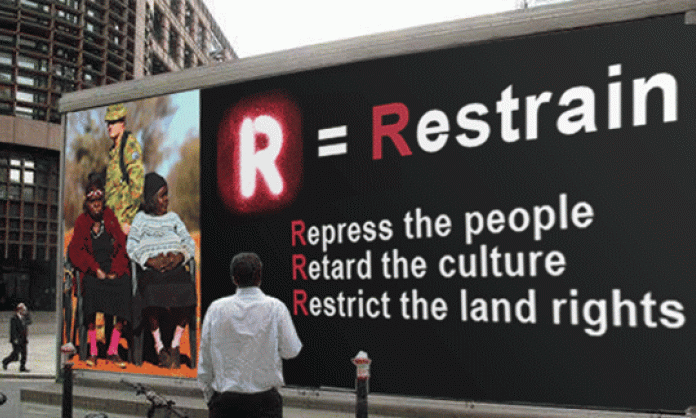The closure of 150 Aboriginal communities in Western Australia is just one more example that highlights the sham nature of the federally funded Recognise campaign. The campaign, which is part of the Reconciliation Australia program, seeks to win constitutional recognition for Aboriginal and Torres Strait Islanders.
Recognise describes itself as a “people’s movement”. But the fact that it is supported by mining companies and Tony Abbott, who are leading the assault on Aboriginal rights, says a lot about its real nature.
A number of prominent Aboriginal people have come out in support, including Patrick Dodson, Lowitja O’Donoghue and Archie Roach, but many others have called for an outright rejection of the campaign because of its failure to address sovereignty, self-determination and land rights.
In July 2011, a survey conducted by the National Congress of Australia’s First People, which is a member of the NGO Steering Committee for the campaign, identified three important policy areas for Indigenous Australians: health, education and sovereignty. Eighty-eight percent of Congress members identified sovereignty and its constitutional recognition as a top priority.
However, an “expert panel”, set up to determine the recommendations for constitutional reforms, has rejected the inclusion of sovereignty. “Any proposal relating to constitutional recognition of the sovereign status of Aboriginal and Torres Strait Islander peoples would be highly contested by many Australians”, the panel said.
The panel is full of rich whites as well as prominent Aboriginals such as Patrick Dodson, Noel Pearson and Marcia Langton. It concluded in its 2012 report to then prime minister Julia Gillard that any proposal which includes the recognition of Aboriginal sovereignty would not “contribute to a more unified and reconciled nation”.
According to Aboriginal activist and lawyer Michael Mansell, the current constitutional recognition proposal is therefore more about allowing the Australian state “to have a more presentable face than providing a benefit to Aboriginals”. Mansell in a 2011 paper criticised the Recognise campaign, saying that while it allowed the removal of discriminatory race clauses in the constitution, it is “assimilationist in nature”.
The assimilationist character of Recognise has also been condemned by Aboriginal activist Michael Anderson. In a statement issued in June 2012, Anderson noted that the Recognise campaign was little more than “tinkering at the edges of a profoundly racist constitution” and offered no solution for Aboriginal and Torres Strait Islander peoples. According to Anderson, the only “constitutional reform with the potential for justice” for Aboriginal and Torres Strait Islander people was a “sovereign treaty” that recognises Indigenous sovereignty, land-rights and self-determination.
Aboriginal feminist and unionist Celeste Liddle wrote in a Guardian column last year: “The longer the Recognise campaign goes on, the more I feel it proves itself to be little more than a government-sponsored ad campaign removed from grassroots Indigenous opinion.” Liddle argued that the campaign seemed “to be little more than corporate endorsements and photo opportunities for powerful figures to prove how much they like us”.
The Recognise campaign was similarly rejected by prominent Aboriginal leaders and elders at the November 2014 First Nations Freedom Summit. Attended by more than 100 representatives of Aboriginal communities from around Australia, the primary focus of the Freedom Summit was on the struggle for sovereignty, self-determination and land rights.
In a statement issued at the conclusion of the two-day Freedom Summit, members condemned “the extreme assaults from all levels of government” on Aboriginal communities and called for the resignation of Abbott’s Indigenous Advisory Council, saying that “there is no grass-roots representation of our people at the national level” and that the hand-picked council was a “farce”.
The Freedom Summit statement also called for mass grassroots actions in the streets “to defend our rights and enforce our vision of self-determination and continuing sovereignty”.








